Hi all,
I have been building my first FreeNAS following the general recommendations found on this site and in the forum. All went actually pretty well. There's just one thing that still gives me some headaches. I am still to find the correct configuration for the boot disk(s). I started with two SANDisk SSD Plus 2.5’’ and tried to set up a mirrored boot configuration from the beginning. It never worked. With one exception I only managed to install FreeNAS once on the SANDisk SSD Plus 2.5''! Frustrated I turned to an 10 year old Samsung disk with 250 GB. With it, it always worked and I never experienced any errors (so far).
I returned both my SANDisk SSD Plus 2.5'' an ordered one WD Green 3D Nand. With this the installation was unproblematic. However, after a week the first scrub run on the boot device detected a couple of corrupted files. I managed to reinstall FreeNAS, only this time it also took me two attempts. Then, yesterday, I ran a verify installation on the bootdisk only to find out, that there are corrupted files... Presently, I have put back my old SAMSUNG disk and everything is fine again. But I am still puzzled as to what boot disk I should use. A lot of users seem to go for the usb thumb drives, an option I discarded because using SSD was the preferred option according to the hardware guide. So, which SSD should I use, and why did I experience such problems with the ones I tried. Thank you very much for your help.
Referenced Parts:
SANDisk SSD Plus 2.5''
WD Green 3D Nand
2.5'' SAMSUNG SpinPoint M5S 250 GB (sold out)
I have been building my first FreeNAS following the general recommendations found on this site and in the forum. All went actually pretty well. There's just one thing that still gives me some headaches. I am still to find the correct configuration for the boot disk(s). I started with two SANDisk SSD Plus 2.5’’ and tried to set up a mirrored boot configuration from the beginning. It never worked. With one exception I only managed to install FreeNAS once on the SANDisk SSD Plus 2.5''! Frustrated I turned to an 10 year old Samsung disk with 250 GB. With it, it always worked and I never experienced any errors (so far).
I returned both my SANDisk SSD Plus 2.5'' an ordered one WD Green 3D Nand. With this the installation was unproblematic. However, after a week the first scrub run on the boot device detected a couple of corrupted files. I managed to reinstall FreeNAS, only this time it also took me two attempts. Then, yesterday, I ran a verify installation on the bootdisk only to find out, that there are corrupted files... Presently, I have put back my old SAMSUNG disk and everything is fine again. But I am still puzzled as to what boot disk I should use. A lot of users seem to go for the usb thumb drives, an option I discarded because using SSD was the preferred option according to the hardware guide. So, which SSD should I use, and why did I experience such problems with the ones I tried. Thank you very much for your help.
Referenced Parts:
SANDisk SSD Plus 2.5''
WD Green 3D Nand
2.5'' SAMSUNG SpinPoint M5S 250 GB (sold out)
Last edited:




